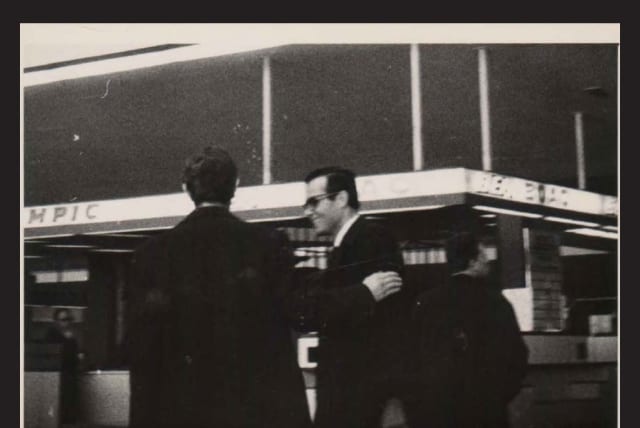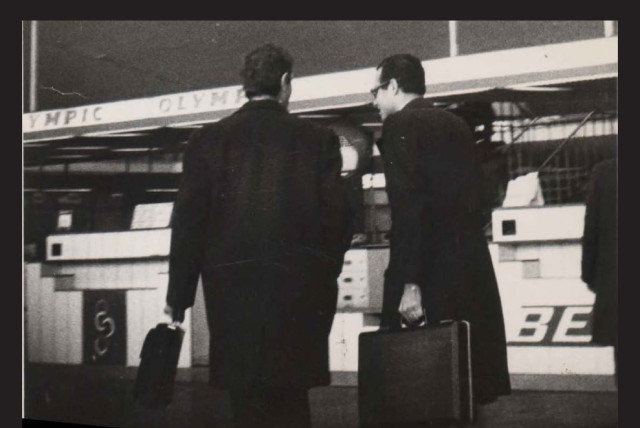Egypt wanted a limited war, Mossad reveals in declassified Yom Kippur docs

Barnea: We can’t underestimate potential existential threats
The Mossad on Thursday initiated its own declassification of history for the first time, relating to before, during, and after the 1973 Yom Kippur War.
As part of a ceremony conducted by Mossad Director David Barnea, and with a number of former Mossad chiefs and senior officials in attendance, the spy agency released a book called Some day, when it can be revealed.
The title is taken from a statement made by then-prime minister Golda Meir to then-Mossad chief Zvi Zamir. The book presents original internal Mossad cables, summaries, photos, and other materials not revealed before in their entirety.
According to Zamir’s real-time notes from October 1971, after he revealed to Meir aspects of then-Egyptian president Anwar Sadat’s strategy as leaked by the Mossad’s top spy, “the Angel,” Meir said to him, “Some day, when it can be revealed, you and your team will get a prize.”
The Angel': Mossad's agent in Egypt
The true identity of “The Angel,” Ashraf Marwan, was revealed decades ago. Books have been written to try to decode when he helped the Mossad, when he helped Egypt, and when those two mixed, including his multiple warnings to Israel that Cairo was going to initiate a war – warnings that were dismissed by many in the defense establishment.
Marwan held top intelligence positions in Egypt both during Gamal Abdel Nasser’s and Anwar Sadat’s reigns as president, and he was married to one of Nasser’s daughters.
The book unveils some new information from protocols of discussions Sadat had with Russian officials in Moscow in 1971.
The protocols indicate Sadat’s intentions to seek to regain all of Sinai, either by diplomatic negotiations or by military confrontation. The Mossad said it was the first indication of Sadat’s willingness to go for a less aggressive option. The book further discloses, for the first time, a change in the Egyptian national security strategy regarding the minimal buildup of forces it would need to go to war.
Before the end of 1972, the Egyptian assumption was that it could not contemplate going to war with Israel without specific advanced attack aircraft and long-range surface-to-surface missiles.
According to the Mossad materials, by that time, Marwan had provided “a sensitive and unique update” that indicated the Egyptians were “leaning toward going to war even without the weapons,” which until then was viewed as a prerequisite.
Speaking at the book launching on Thursday, Barnea said: “We cannot fail to confront existential threats to Israel or underestimate the enemy and its capabilities.”
Rather, “we must establish our deterrence power; we must drive forward to normalization,” he said. “A state that does not take the aspiration for peace seriously will be left stuck in war.”
How the Yom Kippur War changed the Mossad
At the time of the Yom Kippur War, the Mossad was mainly a spy agency for conducting special operations and gathering intelligence for them.
But it was not until after the war that the Mossad gained a more significant and parallel foothold to the IDF Intelligence Corps when it came to big-picture and long-term strategic questions of war and peace.
The materials provide a substantial view into Egyptian and Syrian presidential and high-command strategy and what their plans would be in the event of a war.
They present Zamir as trying to raise alarms about impending war, both through cables and through presenting aspects of raw intelligence to Meir and the other political decision-makers at the time.
On the evening between October 4-5, Dovi, the case officer managing Marwan, notified Mossad headquarters that Marwan had demanded an immediate meeting with him “to give information of great importance… connected to the ‘chemicals’ in his possession.”
“Chemicals” was a code phrase between Dovi and Marwan for warning about potential impending war. Within hours, Zamir flew to London to meet with Marwan.
The book provides the full transcript of the meeting between the two, as summarized by Dovi, including the conclusion: “There is a 99% probability that the war will start tomorrow on Saturday… and it will start simultaneously from both the Egyptians and the Syrians.”
The Mossad said Zamir immediately had called his senior aide Freddy Eini in Tel Aviv with a coded message, which Eini decoded and provided to Meir. The materials include the original cable sent by Eini – together with handwritten notes – to Meir’s military secretary.
Syria’s goal was to conquer the Golan Heights, and Jordan would stay out of the war, Marwan told Zamir. He revealed specific plans of what areas the Egyptian air force would attack, including air bases, as well as what it would not attack – civilian areas within the 1967 Green Line.
The war began at 2 p.m. the next day. Zamir gave a “golden” piece of intelligence to the cabinet on October 12, appearing in the book in original format for the first time: Israeli forces had succeeded in crossing the Suez Canal, a report that dramatically shifted Israel’s goals.
Eini and Dovi also received honors at Thursday’s ceremony for their work with Marwan and Zamir. Previously, Zamir and his team had been blamed for not sufficiently emphasizing the warning. But over time, they were given more credit for delivering the warning to the political echelon.
More blame has been placed on portions of IDF Intelligence for ignoring the warnings as not based on sufficient evidence or for viewing Marwan as unreliable.
IDF Intelligence remained sore at the time for two previous instances, in 1972 and earlier in 1973, when Marwan had warned of imminent war, and they had taken the warning seriously, including once calling up the reserves – as it turned out, needlessly.
Barnea said Marwan had been loyal to Israel, citing his consistent deliveries of incredibly sensitive information about Egypt.
Jerusalem Post Store
`; document.getElementById("linkPremium").innerHTML = cont; var divWithLink = document.getElementById("premium-link"); if (divWithLink !== null && divWithLink !== 'undefined') { divWithLink.style.border = "solid 1px #cb0f3e"; divWithLink.style.textAlign = "center"; divWithLink.style.marginBottom = "15px"; divWithLink.style.marginTop = "15px"; divWithLink.style.width = "100%"; divWithLink.style.backgroundColor = "#122952"; divWithLink.style.color = "#ffffff"; divWithLink.style.lineHeight = "1.5"; } } (function (v, i) { });

